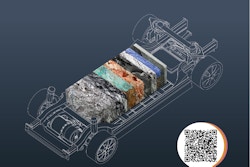New report: Driving change, not deforestation
EU demand for electric vehicles drives deforestation
A new report finds that the EU's electric car policy towards 2050 could lead to massive deforestation, equivalent to 18 football fields a day for 25 years. The good news: There are clear solutions to reduce deforestation from the transport transition.

MINING: Illegal mine in a deforested area of the Amazon. Foto: Shutterstock
By Regnskogfondet.
The report “Driving change, not deforestation: How Europe could mitigate the negative impacts of its transport transition” was launched this week at the OECD's Forum for Responsible Mineral Value Chains in Paris and is published by Rainforest Foundation Norway in collaboration with the Brussels-based organization Fern.
The French think tank négaWatt has modelled the transport sector's demand for metals and minerals. Based on these models, researchers at the Vienna University of Economics and Business (WU) have developed different deforestation scenarios, adjusting for several policy actions.
Battery production is linked to 70% of the deforestation footprint from electric cars.

REPORT LAUNCH: Launching the report at the OECD Forum on Responsible Mineral Supply Chains Photo: Rainforest Foundation Norway
A roadmap for ensuring a just and sustainable transition
While the report paints a bleak picture of the consequences of the electric vehicle transition under a business-as-usual scenario, it also presents a roadmap for ensuring a just and sustainable transition.

“Unless we act, Indigenous Peoples and local communities will pay a heavy price for our move to EVs. A range of measures can stop this. These include laws to ensure that critical minerals’ supply chains are transparent, traceable and accountable. That companies at both ends of the supply chain are conducting environmental and human rights due diligence, and that investors use their power to exert pressure on companies to end any abuses.”
Jasmine Puteri, Senior Advisor for Supply Chains at Rainforest Foundation Norway.
Policies that promote smaller cars, facilitate car-sharing, and improve public transport infrastructure have the potential to reduce the risk of deforestation significantly.
Beyond reducing the overall demand for critical minerals in the electric vehicle transition, the mineral composition of different battery technologies have a significant impact. The report documents significantly higher deforestation risks linked to nickel, cobalt and copper, encouraging producers and importers to favor low-deforestation battery technologies. As a bonus, these technologies are often more affordable.
"The future deforestation impacts of EVs will also depend on where we source the metals. (..) Taking mining locations into account is therefore very important to minimise negative impacts on forests," says Stefan Giljum, head of the research team at WU Vienna.
Further, the report highlights the crucial role of clean and transparent value chains to ensure the electric vehicle transition does not drive deforestation. Measures include establishing no-go zones for mining in vulnerable areas and requiring high social and environmental standards throughout the supply chains.

Report highlights
Key findings:
- EU Metal demand will peak by 2030 reaching 4.5 million tonnes as the market shifts towards an increased use of electric vehicles
- Electric Vehicle-related mining expansion could result in 65,200 hectares of deforestation by 2050
- 70% of the deforestation footprint of Electric Vehicles depends on the type of battery technology used.
Batteries using cobalt, copper, and nickel, are linked to the highest deforestation rates
Key solutions:
- Reduce the demand for personal vehicles: Car-sharing and public transport models will reduce the demand for vehicles.
- Reduce battery and vehicle size: Smaller vehicles require smaller quantities of minerals.
- Enhance recycling and prioritise low-deforestation battery technologies: These battery technologies (such as LFP) are often more affordable.
- Clean the value chains: Establish “no-go zones” for mining, favour countries with lower deforestation risks, and uphold high social and environmental standards.

"The stakes are high: Under the current scenario, 18 football fields of forest will be destroyed every day until 2025, in the name of the green transition. If we make the right choices for battery technology now, deforestation can be avoided”
Ingrid Tungen, Head of Deforestation-Free Markets at Rainforest Foundation Norway.
Contacts:

Ingrid Tungen
Head of Deforestation-free Markets
(+47) 414 73 806
ingrid.t@rainforest.no

Jasmine Puteri
Senior Supply Chains Adviser Palm Oil, Logging, Extractive Industries, Deforestation-free Markets
(+47) 479 78 180
jasmine@rainforest.no
